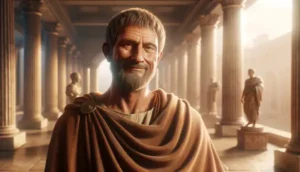Seneca emphasizes the need for regular reflection and examination of stored knowledge: “My mind needs to be unrolled, and whatever has been stored away there ought to be examined from time to time, so that it may be ready for use when occasion demands.” He points out the different types of subjects and their requirements: “For there are certain subjects about which you can write even while travelling in a gig, and there are also subjects which need a study-chair, and quiet, and seclusion.”
"For there are certain subjects about which you can write even while travelling in a gig, and there are also subjects which need a study-chair, and quiet, and seclusion."
Seneca Tweet This Quote
He points out the different types of subjects and their requirements: “For there are certain subjects about which you can write even while travelling in a gig, and there are also subjects which need a study-chair, and quiet, and seclusion.” Seneca highlights the constancy of a wise man’s happiness, which is independent of external circumstances: “The joy of a wise man, on the other hand, is a woven fabric, rent by no chance happening and by no change of fortune; at all times and in all places he is at peace.”
"The joy of a wise man, on the other hand, is a woven fabric, rent by no chance happening and by no change of fortune; at all times and in all places he is at peace."
Seneca Tweet This Quote
He further explains the nature of true happiness and its independence from external goods: “If the mind is content with its own self; if it has confidence in itself; if it understands that all those things for which men pray…are of no importance in relation to a life of happiness; under such conditions it is sound.”
"If the mind is content with its own self; if it has confidence in itself; if it understands that all those things for which men pray...are of no importance in relation to a life of happiness; under such conditions it is sound."
Seneca Tweet This Quote
Seneca criticizes the insatiable nature of seeking external goods, using a simile from Attalus: “Did you ever see a dog snapping with wide-open jaws at bits of bread or meat which his master tosses to him? Whatever he catches, he straightway swallows whole, and always opens his jaws in the hope of something more.” He contrasts this with the wise man’s contentment: “But it is not so with the wise man; he is satisfied. Even if something falls to him, he merely accepts it carelessly and lays it aside.”
Seneca concludes by emphasizing the importance of resisting distractions and maintaining focus on philosophy: “Let us resist them [distractions] in their early stages. It is better that they shall never begin than that they shall be made to cease.”
"Let us resist them [distractions] in their early stages. It is better that they shall never begin than that they shall be made to cease."
Seneca Tweet This Quote
This letter serves as a powerful reminder of the importance of continuous engagement with philosophy and the need to resist the distractions and busyness that can impede one’s pursuit of wisdom.
***** Letters from a Stoic Key Takeaways is a collection of short key takeaways from the letters sent by Seneca to Lucilius. Read each letter’s key takeways here .




